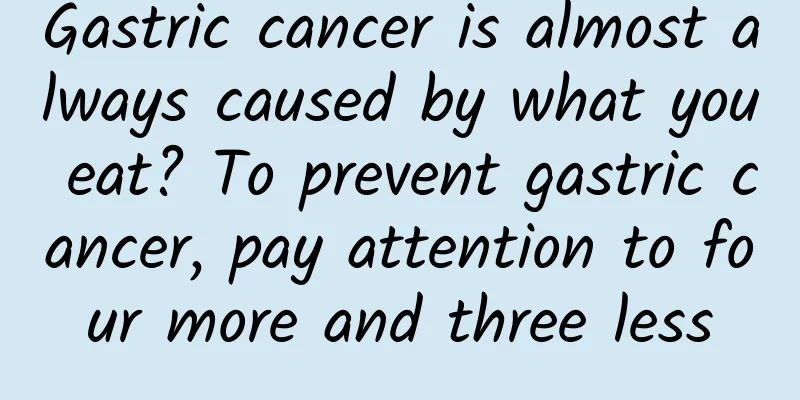Gastric cancer is almost always caused by what you eat? To prevent gastric cancer, pay attention to four more and three less

|
As our lives get better and better, people no longer have to worry about food and drink, and the food they eat is getting better and better. However, the incidence of gastric cancer has increased in recent years. Image from: Weibo screenshot Recently, there is a saying that stomach cancer is caused by eating. This makes many people very confused: Can eating the wrong food really lead to stomach cancer? How to prevent stomach cancer? 1 Half of the world's gastric cancer cases are in China Gastric cancer is one of the most common cancers in the world, and China is a country with a high incidence of gastric cancer. According to the "Current Status of Gastric Cancer Epidemiology in China": In 2012, there were 951,000 new cases of gastric cancer and 723,000 deaths worldwide. Among them, the number of cases and deaths in China accounted for nearly half of the world's total . Nearly 12,000 people are diagnosed with gastric cancer every day, and only 35.9% of these patients survive for more than five years, which means that three people die from gastric cancer every five minutes, bringing a huge disease burden to families, the country, and society. Image from: freepik.com 2 Is stomach cancer caused by diet? What factors cause stomach cancer? In fact, the statement that stomach cancer is caused by diet is somewhat one-sided and too absolute. The carcinogenesis of gastric cancer is a multi-factor, multi-step, and multi-stage development process. There are many factors that lead to gastric cancer, including genetic factors, environmental factors, lifestyle factors, etc. Diet is only one aspect. The common causes of gastric cancer are: Helicobacter pylori infection: Helicobacter pylori is a very clear and unique high-risk factor for gastric cancer. Helicobacter pylori is a Gram-negative bacterium that is mainly distributed in the gastric mucosal tissue. Once an adult is infected, the body cannot heal itself. There are 768 million infected people in China, and almost one in every two people is a carrier of Helicobacter pylori. Among patients infected with Helicobacter pylori, 15%-20% will develop peptic ulcer, 5%-10% will develop Helicobacter pylori-related dyspepsia, and 1% will eventually develop gastric malignancy. The "Expert Consensus on Helicobacter pylori Eradication and Gastric Cancer Prevention and Control in China" clearly points out that Helicobacter pylori infection is the main cause of gastric cancer in China . ■Genetic factors: About 10% of gastric cancer patients are related to family inheritance. If there is a gastric cancer patient in the family, the risk of gastric cancer for offspring will be higher. ■Age: Generally speaking, the older you are, the greater the risk of gastric cancer. Middle-aged and elderly people should pay special attention. ■Emotions: People who are under long-term tension and anxiety are prone to gastric mucosal damage and ulcers, which may indirectly promote the occurrence of gastric cancer. ■Lifestyle habits: unhealthy eating habits, smoking and drinking, etc., will increase the risk of gastric cancer. 3 Which diets increase the risk of stomach cancer? Although eating habits cannot directly lead to gastric cancer, unhealthy eating habits may increase the risk of gastric cancer. The latest report of the International Agency for Research on Cancer shows that the following types of diet may increase the risk of cancer: Image source: IARC report “ Overweight and Obesity Being overweight or obese increases the risk of gastric cancer. You should pay attention to energy balance in your diet and maintain a healthy weight. “ High-salt foods Eating too much salt, eating too much salt, and eating too many high-salt foods can cause chronic damage to the gastric mucosal barrier. Over time, it will increase susceptibility to carcinogens and lead to gastric cancer. For example, be careful not to eat too much pickled foods such as pickles and salted fish. Dietary guidelines recommend that the daily salt intake of each person should not exceed 5g, which is simply the amount of a beer bottle cap. “ Alcohol Drinking alcohol increases the risk of gastric cancer, and drinking more than 3 units of alcohol a day increases the risk of gastric cancer. A meta-analysis found that people's risk of gastric cancer is positively correlated with the amount of alcohol they drink. If you really want to drink, it is recommended that men do not exceed 25 grams of alcohol per day and women do not exceed 15 grams of alcohol. Of course, it’s best not to drink alcohol. It's fun to drink beer and eat skewers in the summer, but you really have to eat less. Image from: freepik.com “ BBQ meat Grilling (including grill and barbecue) meat and fish may also increase the risk of stomach cancer. AI's answer. Image from AI screenshot Grilled meat can easily produce substances such as benzopyrene and polycyclic aromatic hydrocarbons, which are clear carcinogens and will increase the risk of gastric cancer. Similarly, our smoked and grilled foods have the same problem and should be eaten less. “ Processed meat Regular consumption of processed meats may also increase the risk of stomach cancer. The World Health Organization has classified processed meat as a Class 1 carcinogen, meaning it has a clear carcinogenic effect. This may be because it contains multiple factors such as nitroso compounds, heterocyclic amines, and polycyclic aromatic hydrocarbons. Of course, for individuals, the risk of cancer is not that great if you eat it occasionally. But we still want to remind everyone not to eat too much often. Image from: freepik.com “ Eating too little fruit Eating less fruit on a regular basis may also increase the risk of stomach cancer. Eating less fruit will lead to an increased incidence of many chronic diseases, so you should eat more fruit in your daily life. 4 What should we do to prevent gastric cancer? I suggest you start from these aspects: 1. Helicobacter pylori treatment As mentioned before: Helicobacter pylori is a very clear and unique high-risk factor for gastric cancer, and is also the main cause of gastric cancer in my country. (Highlights) Studies have shown that eradication of Helicobacter pylori can effectively prevent gastric cancer and can reduce the incidence of gastric cancer in the population by 39%. It also has the effect of preventing gastric cancer in people with severe precancerous lesions and the elderly. Helicobacter pylori testing can be performed during annual physical examinations. If the result is positive, it is recommended to follow the doctor's advice for eradication treatment. Image from: freepik.com 2. Develop healthy living and eating habits Long-term poor diet and lifestyle will increase the risk of gastric cancer. Try to do "four more and three less": Four more ■Eat a diverse and balanced diet to ensure nutritional balance. ■ Eat more fresh meat, especially chicken, duck, fish and shrimp, and less processed meat. ■Maintain a healthy weight and exercise more . ■ Eat more fresh vegetables and fruits. Three Young Masters ■ Eat less pickled food ■Eat less barbecued and smoked foods. ■Quit smoking and drinking. Image from: freepik.com 3. Have regular physical examinations and seek timely treatment if you feel unwell Cancer is difficult to treat, often because people neglect to check up on it, and by the time symptoms appear it is often too late. The development of gastric cancer generally goes through a process from chronic gastritis to intestinal metaplasia, and then to dysplasia and cancer. Therefore, it is best to develop the habit of regular physical examinations. If the physical examination finds early symptoms of gastric disease, it should be checked and treated in time. If you have chronic gastric ulcers, gastric polyps, atrophic gastritis, accompanied by abdominal pain, gastrointestinal bleeding and other symptoms, you must receive standardized treatment and regular check-ups, and don't let minor problems turn into big ones. References Zuo Tingting, Zheng Rongshou, Zeng Hongmei, et al. Current epidemiological status of gastric cancer in China[J]. Chinese Journal of Clinical Oncology, 2017, 44(1): 52-58. Yan Chao, Shan Fei, Li Ziyu. Analysis of the global burden of gastric cancer in 2020: focusing on the current epidemic situation in China[J]. Chinese Journal of Oncology, 2023, 32(03): 161-170. Zhao Honglin, Li Tingting, Ding Guowu. Analysis of the changing trend of gastric cancer disease burden among Chinese residents from 1990 to 2019[J]. Public Health and Preventive Medicine, 2023, 34(03): 22-26. Cheng Xiaofen, Min Shuhui, Guo Ruiqi, et al. Age-period-cohort analysis of gastric cancer incidence and mortality in China from 1990 to 2019 and prediction of changing trends from 2020 to 2030[J]. Chinese Journal of Oncology, 2023, 32(06): 454-461. Yang Dandan, Yao Xuecheng, Zhang Xinhan, et al. Meta-analysis of influencing factors of gastric cancer in Chinese population[J]. Preventive Medicine, 2022, 34(06): 561-570. DOI: 10.19485/j.cnki.issn2096-5087.2022.06.004. IARC. 2018 stomach cancer report. Bouras E, Tsilidis KK, Triggi M, Siargkas A, Chourdakis M, Haidich AB. Diet and Risk of Gastric Cancer: An Umbrella Review. Nutrients. 2022 Apr 23;14(9):1764. doi: 10.3390/nu14091764. PMID: 35565732; PMCID: PMC9105055. Maddineni G, Xie JJ, Brahmbhatt B, Mutha P. Diet and carcinogenesis of gastric cancer. Curr Opin Gastroenterol. 2022 Nov 1;38(6):588-591. Deng W, Jin L, Zhuo H, Vasiliou V, Zhang Y. Alcohol consumption and risk of stomach cancer: A meta-analysis. Chem Biol Interact. 2021 Feb 25;336:109365. Dong J, Thrift AP. Alcohol, smoking and risk of oesophago-gastric cancer. Best Pract Res Clin Gastroenterol. 2017 Oct;31(5):509-517. Wu X, Chen L, Cheng J, Qian J, Fang Z, Wu J. Effect of Dietary Salt Intake on Risk of Gastric Cancer: A Systematic Review and Meta-Analysis of Case-Control Studies. Nutrients. 2022 Oct 12;14(20):4260. Li Q, Zhang J, Zhou Y, Qiao L. Obesity and gastric cancer. Front Biosci (Landmark Ed). 2012 Jun 1;17(7):2383-90. doi: 10.2741/4059. PMID: 22652786. Tsekrekos A, Lovece A, Chrysikos D, Ndegwa N, Schizas D, Kumagai K, Rouvelas I. Impact of obesity on the outcomes after gastrectomy for gastric cancer: A meta-analysis. Asian J Surg. 2022 Jan;45(1):15-26. HongYu, et al. Serum pepsinogenII levels are doubled with Helicobacter pylori infection in anasymptomatic population of 40,383 Chinese subjects, Medicine (Baltimore). 2021 Jul 9;100(27):e26562. Bradbury KE, Appleby PN, Key TJ. Fruit, vegetable, and fiber intake in relation to cancer risk: findings from the European Prospective Investigation into Cancer and Nutrition (EPIC). Am J Clin Nutr. 2014 Jul;100 Suppl 1:394S-8S. Naemi Kermanshahi M, Safaei E, Tutunchi H, Naghshi S, Mobarak S, Asadi M, Sadeghi O. Fruit and vegetable intake in relation to gastric cancer risk: A comprehensive and updated systematic review and dose-response meta-analysis of cohort studies. Front Nutr. 2023 Feb 6;10:973171. Peleteiro B, Padrão P, Castro C, Ferro A, Morais S, Lunet N. Worldwide burden of gastric cancer in 2012 that could have been prevented by increasing fruit and vegetable intake and predictions for 2025. Br J Nutr. 2016 Mar 14;115(5):851-9. doi: 10.1017/S000711451500522X. Epub 2016 Jan 22. PMID: 26794617. Expert consensus on Helicobacter pylori eradication and gastric cancer prevention and control in China (2019, Shanghai)[J]. Chinese Journal of Digestion, 2019-04-12. Zhao Weipeng, Chu Yanliu. Research status and prospects of gastric cancer risk assessment system[J]. China Medical Herald, 2023, 20(07): 59-62+67. den Hoed CM, Kuipers EJ. Gastric Cancer: How Can We Reduce the Incidence of this Disease? Curr Gastroenterol Rep. 2016 Jul;18(7):34. Cover image from freepik.com |
<<: Why new genomic data has the potential to rewrite the history of human evolution
Recommend
After analyzing 100 cases, we summarized these 3 creative methods for Dragon Boat Festival activities!
The Dragon Boat Festival is coming soon, have you...
How to solve the problem of low conversion? 6 key points for high conversion!
In an era of traffic panic, even if you have mill...
How should we write copy when facing “cold” B-end products?
Whether it is C-end or B-end, copywriting creatio...
Apple iOS 15 Beta3 Updates: New Safari Search, Apple Music Widget
[[411384]] July 15 news: In the early hours of to...
Review of marketing cases in Q1 2022!
In a blink of an eye, three months have passed in...
How much does it cost to join the Xiantao Fresh Food Mini Program?
How much does it cost to join the Xiantao Fresh F...
Can I visit the cemetery during the Qingming Festival this year? What are the rules for visiting graves? Attached are the latest regulations for various regions in 2022!
April Fools' Day is held on April 1st. It is ...
When you reach middle age, you need to "quit" these things to cut off the path of cancer cells.
When people reach middle age, they need to "...
Yixi Emotion "Attraction" Baidu Cloud Download
Yixi Emotion’s “Attraction” has a total of ten vid...
Java idioms summary
In Java programming, some knowledge cannot be lea...
Tianshui Mini Program Customization Company, how much does it cost to customize a paper product mini program?
WeChat Mini Program is an application that users ...
91 Ten Articles: WeRide's valuation exceeds 20 billion, SAIC will launch a battery bank, and Huolala may build cars
1. WeRide raised hundreds of millions of dollars ...
How to carry out promotion operations? Share 10 tips!
The era of the entire network has arrived, and on...
World's first! Gene-edited pig heart transplanted into human body
The University of Maryland School of Medicine iss...
Can't eat vegetable oil? Is leached oil harmful to the human body? After reading this article, let's eat oil healthily!
gossip Recently, on a short video platform, a use...









